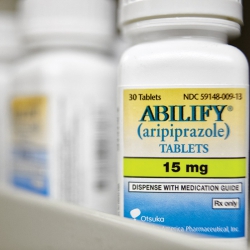A Northern Florida judge begins hearing cases in the next few weeks involving Abilify, a prescription drug alleged to have caused gambling addiction in certain patients. Abilify, generically known as Aripiprazole, is described as an antipsychotic drug.
Since it was approved by the Food and Drug Adminstration (FDA) in 2004, Abilify has been prescribed for depression, schizophrenia, and bipolar disorder. Sales of Abilify peaked in 2013-2014, but by that time, news reports had begun to emerge of the drug causing physical, mental, and emotional problems in patients.
Hundreds of Abilify Lawsuits
Over the past few years, hundreds of Americans have filed lawsuits against Bristol-Myers Squibb and Otsuka Pharmaceutical, the makers of Abilify. Those lawsuits claims that drug has caused a variety of behavioral problems, including shopping addiction, eating disorders, sex addiction, and problem gambling.
In many anecdotal cases, people taking the drugs seem unable to stop themselves from compulsive behaviors.
Many patients say, when they stop taking Abilify, their compulsive and addictive behavior stops. Enough lawsuits have been filed that they became unruly for the legal system.
Richard Root, a New Orleans lawyer involved in several Abilify lawsuits, said, “People were filing federal lawsuits all around the country.”
US District Court of M. Casey Rogers
On June 24, 2016, on the orders of the U.S. Judicial Panel on Multi-District Litigation, those cases were refiled in the U.S. District Court of the Northern District of Florida. The panel said pooling the cases in one court would avoid multiple redundant cases of discovery, along with contradictory rulings on evidence.
Chief Judge M. Casey Rogers is scheduled to hear cases in Pensacola and Tallahassee. All of the cases challenge whether the manufacturers should have known that Abilify “was defectively designed or manufactured”.
Abilify Horror Stories
Not all of the cases involve problem gambling, but many of them do. Until January 2016, the U.S. Drug Administration did not warn that the drug might cause problem gambling, despite such warnings from drug industry regulators in Europe and Canada.
In the worst cases, several forms of uncontrollable behavior manifested. One Las Vegas woman said she lost a high-paying job in the business world, while eventually gambling away $1 million to $2 million at the casinos. She eventually lost everything and had to move back into her parents’ home, but her compulsive behavior continued. Her compulsions led her into a life of prostitution, which caused a rift with her family, at which point she sought help for her compulsions.
When she learned of Abilify’s known side effects, she stopped taking the drug and her gambling addiction stop. Now, attorney Mike McDivitt of Las Vegas is representing the woman in one of the hundreds of Abilify cases.
USDA: “Compulsive or Uncontrollable Urges”
In January last year, the USDA finally added that “compulsive or uncontrollable urges to gamble, binge eat, shop, and have sex.” By that time, many Abilify users had lost tens of thousands of dollars in gambling binges at brick-and-mortar casinos, on lottery tickets, and in online gambling.
Many times, the worst Abilify horror stories do not involve compulsive gambling. In certain cases, Abilify patients’ behavioral issues led them down a path of prostitution. Others became estranged from their families, as their unexplained, out-of-control behavior ruined finances and destroyed a lifetime of built-up trust.
FDA: “Closely Monitor” Patients
Since the USDA warning was placed on bottles of Abilify, the FDA has warned doctors to “closely monitor” patients, while making sure “patients and caregivers [are] aware of the risk of these uncontrollable urges”.
Along with those warnings, the FDA recommended physicians consider prescribing other drugs.
Bristol-Myers Squibb, the American manufacturer of Abilify, is reluctant to stop production of the drug. The pharmeceutical company admits Abilify is its biggest-selling product, with $5.45 billion in sales in 2014 alone. In 2016, the company agreed to pay a $19.5 million settlement in 42 different states and the District of Columbia to “to resolve claims it engaged in unfair or deceptive trade practices”.
Eric Schneiderman’s Pursuit of Bristol Myers-Squibb
That settlement likely will be the first of many payouts, given the vast number of cases now in the US court system. The December 2016 case settled in New York State involved only “off-market” cases, because Bristol Myers-Squibb stopped marketing the drug directly in 2013. Now, Otsuka markets the drug.
Given the 2016 settlement was a tacit admission that Bristol Myers-Squibb used “unfair or deceptive trade practices” to keep Aripiprazole on the market, many of the plaintiffs likely will receive damages. That will be a long, grueling process that begins in Tallahassee and Pensacola courtrooms over the next few weeks.

